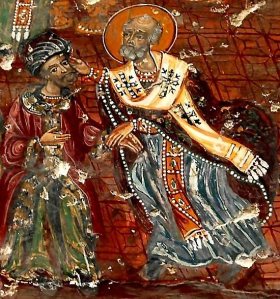It is correct to say that Conrad Grebel and Felix Manz did not desire to separate from the church but instead they desired to “try to win Zwingli and the Zürich government for a re-establishment of the apostolic church”.[1] This imagined apostolic church they desired would take the form of a “tortured church state structure, led by a decidedly Christian government and by Zwingli, to which the majority of the population would belong.”[2]
This is seen shortly following the first disciples’ baptism in January of 1525 when “the churchgoers Zollikon . . . gathered in the church for worship. Their pastor, Niklaus Billeter, is about to mount the pulpit, when” Georg Blaurock entered the church.[3] Then between:
the two an excited conversation takes place before the congregation. Blaurock asks the pastor the rhetorical question of what he intends to do. Billeter answers as a good Zwinglian: “I will preach the Word of God.” Blaurock replies: “Not you, but I have been sent to preach.” Billeter calls his attention to the fact that he has been sent, namely, by his superior at the canon seat of the Grossmünster Church in Zürich, which for ages had engaged the clergyman for Zollikon.
Blaurock was not satisfied by this information and continued to talk. Meanwhile, Billeter had mounted the pulpit and had begun to preach. But Blaurock was still disturbing, and Billeter interrupted his sermon, came down from the pulpit and turned toward the door, certainly not to vacate the place in the pulpit for the disturber but to shorten the tumult.[4]
Then the congregants made it clear that they did not want the pastor to stop the sermon so Billeter returned to the pulpit and continued while telling the audience that “if anyone wanted to show him his errors he should do so privately in the personage, but not . . . in the church”.[5] In response Blaurock interrupted the sermon again saying “It is written, ‘My house shall be called a house of prayer’; but you make it a den of robbers.”[6] He then took a stick he had with him and rapped it against a church pew four times ultimately ending with “Deputy Bailiff Wuest, who was present in the church, arose and threatened the disturber with jail if he did not immediately desist.”[7] Six months later in the town of Hinwil we see a similar incident in the church pastored by Hans Brennwald. When the people arrived:
to the regular Sunday morning service of the church and awaited the pastor. But before he . . . appeared, that is, before the service began . . . Blaurock stepped up into the pulpit and preached, introducing himself with the explanation: “Whose house is this? Is this God’s house where the Word of God should be proclaimed? Them I am here as an ambassador from the Father to proclaim the Word of God” . . . Brennwald came too late; he was not able to expel the intruder and had to call on the bailiff for help.[8]
These incidents reveals two things regarding the perspective of the proto-Anabaptists. For Blaurock “the development of Anabaptist movement in Zollikon was too slow. He wanted to attempt to convert the population, if possible, at one stroke through preaching in the church.”[9] Even though the movement began just months earlier Blaurock felt that he had a role to play in the purposes of God and his role was to set God’s house aright. Thus his continued reference to Matthew 21:13 suggesting that the state Church was connected to God but was corrupted and needed cleansing.
Early on there were two kinds of separation or Absonderung, the first being “separation from the world and its evil works”. It consisted of shunning the unbiblical and immoral teachings and practices of the Roman Catholic and Protestant churches. This calls back to Georg Blaurock’s thinking and behavior. The other form is full “separation from the church”.
Generally when addressing Absonderung people will reduce it to something as simple as saying that the early members of the Brethren in Christ (Brüder in Christo) later the Swiss Brethren (Schweizer Brüder) sought to remain attached to the state church until they were left with no alternative. As seen with Blaurock it can be argued that the Anabaptists embraced “separation from the world and its evil works” universally from the initiation of the movement. For instance when one looks at the one many people hold as the ‘father of Anabaptism’ Conrad Grebel. Grebel felt that every:
reminder of the Roman mass must be eliminated. In its place a simple Supper was to come, in which only the installation words were to be read, and which would not be taken in the church but in the homes of believers, without clerical dress, with ordinary bread and ordinary drinking cups, as a symbolic meal demonstrating the fellowship of Christians with each other and with Christ . . . Baptism should not be given to children but, according to the usage in the early church, to adults who have become believers, and should signify that we have washed from sin . . . Baptism and Lord’s Supper therefore . . . lacked sacramental character.[10]
This conception of the community of God was founded on Grebel’s Biblicism. That is, it was on “the basis of their interpretation of the authority of the Scriptures.”[11] And it was this hermeneutic that led Grebel and his companions “to withdraw from the Reformed folk church in Zurich and set out to establish a church form to correspond to the pattern of primitive Christianity, namely, a church of the few who have come to personal faith in Christ and have been baptized on the basis of their faith . . . . But Grebel did not preach withdrawal only from the folk church, but also from the life of the state.”[12] Before commenting on the contents of Grebel’s position, one more account needs to be considered.
The Zollikon congregation was granted permission by the Zürich Council “to hold private gatherings had been granted to the Anabaptists on February 7, 1525, at the same time when they were prohibited from maintaining a separate church.”[13] In addition to this they “were not to baptize any more, but among themselves they might meet for Bible study.”[14] Georg Blaurock appeared and the baptizing of adults commenced once again leading to more sanctions by the Zürich Council in March regarding “baptizing, that is, against founding their own church.”[15]
The Anabaptists obeyed the Council’s demands and they created their conventicles or “Bible groups” and “ignored the church services and the pastor” based on the directive given them back in February.[16] This was not what the Zürich Council desired, they “had intended such gatherings to take place within the church; that is, the participants in these Bible groups should also go to church and regard themselves as members of the state church.”[17]
In August the Zürich Council forbade them from gathering privately and they were required to “go to church and there hear the word of God”.[18] Upon receiving this order the Zollikon Anabaptists gathered to decide how best to respond this this new mandate. The congregation arrived at the decision “to give up baptizing, simply live the Christian life together, and be obedient to my lords”.[19] To put it another way, the “plan to organize an Anabaptist free church in Zollikon was buried; also the gatherings in the houses here and there were discontinued; the brothers would still remain bound to each other in the Christian spirit, but without an independent organization; they would render obedience to the regulations of the Council in regard to church attendance and membership in the state church.”[20]
In this instance we see that the Zollikon group began holding the same position as Grebel, a short while later they tried their best to maintain their autonomy within the parameters established by Zurich Council. When this was not enough they abandoned any thoughts of creating a community of genuine believers and began again to attend the Reformed state church. While this behavior seems out of character with the fearlessness and martyr’s spirit the Anabaptists are known for the reader has to be mindful that this was during the formative first year of the movement. With that being said while they conceded to the state church it was only in the areas of baptism and separation from the Reformed Church. No one are we told that they changed their views on any other matter.
From all of this we see that Conrad Grebel and the earliest Anabaptist community held to a position analogous to what is found in the Brüderlich Vereinigung or Schleitheim Brotherly Union that was drafted later in 1527. The Brotherly Union defined Absonderung in the following fashion. It says:
From all this we should learn that everything which has not been united with our God in Christ is nothing but an abomination which we should shun. By this are meant all popish and repopish works and idolatry, gatherings, church attendance, winehouses, guarantees and commitments of unbelief, and other things of the kind, which the world regards highly, and yet which are carnal or flatly counter to the command of God, after the pattern of all the iniquity which is in the world.[21]
Therefore two years later the concept of Absonderung or separation comprised of a melding of separation from the church and separation from the world and evil works. But also at this time the accounts featuring Georg Blaurock and the fate of the Zollikon congregation demonstrate that separation in both areas was not universally and simultaneously held. They held both and one position
Another point worth looking at is how Anabaptists related to the state Churches varied by location. Blarock’s and the first Anabaptist congregation’s actions initially occurred in Zollikon then in Hinwil. But when you look at the city of Therwil you will get a different picture.
The Anabaptists relationship with the state church in the city of Therwil was a remarkably divergent from what occured in Zollikon and Hinwil. The Anabaptists actually thrived and functioned in the midst of the state church during the year of 1526. The reason being was that the priest that served there was considerate towards the Anabaptists and their message. This was evidenced by his benevolently opening his home to the Anabaptists for their meetings at the risk of his own welfare and life.[22] Thus from this chronicle it posits the fact that the state churches’ in an area response to the Anabaptist message early on determined how the Anabaptists viewed it and associated with it.
__________________________
[1] Fritz Blanke, Brothers in Christ: The History of the Oldest Anabaptist Congregation, Zollikon, Near Zurich, Switzerland (Eugene, Or.: Wipf & Stock Publishers, 2005), 20.
[2] Ibid., 12.
[3] Ibid., 29-30.
[4] Ibid., 30.
[5] Ibid.
[6] Ibid.
[7] Ibid., 31.
[8] Ibid.
[9] Ibid.
[10] Ibid., 14.
[11] Ibid., 15.
[12] Ibid.
[13] Ibid., 67-8.
[14] Ibid., 68.
[15] Ibid.
[16] Ibid.
[17] Ibid.
[18] Ibid.
[19] Ibid., 69.
[20] Ibid.
[21] John Howard Yoder, ed., trans., The Schleitheim Confession (Scottdale, PA: Herald Press, 1977), 12.
[22] Johannes Gast, De Anabaptismi Exordio, Erroribus, Historijs abominandis, Confutationibus adjectis, Libri duo (Basel; 1544), 360.




